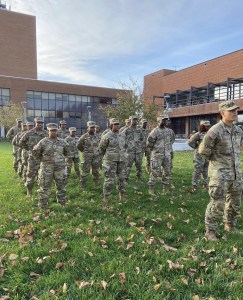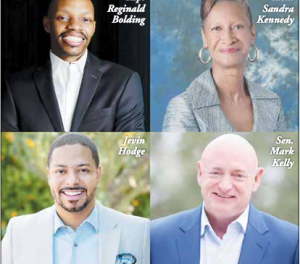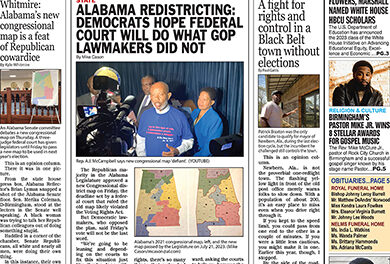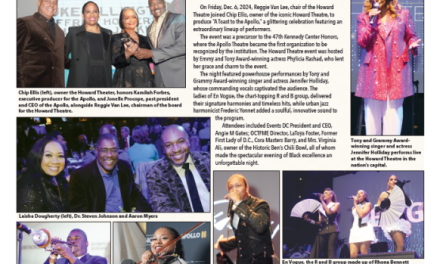By Megan Sayles,
AFRO Business Writer,
msayles@afro.com

Since its inception in 1948, the Morgan State University (MSU) Bear Battalion, has graduated nearly 1,800 graduates. In 1979, George M. Brooks became the first general officer in the U.S. Army to graduate from the historically Black institution’s program.
Today, the Bear Battalion is one of the top producers of Black generals in the U.S. Army— second only to West Point and another historically Black college or university (HBCU), South Carolina State University, according to an MSU news release.
“When students join our program, many are seeking mentorship and resources to navigate life. Most students are trying to decide on a career path, but the instructors in our program invest time to assist cadets with the process,” said Captain Debora Nelson, professor of military science at MSU and department chair for the Bear Battalion.
“They don’t just teach ROTC, they’re mentors. They’re teaching how to budget your money, offering to help students with classes and giving advice.”
An alumna of the Bear Battalion, Nelson wanted to become a military science professor because the ROTC program was life-changing for her. She joined the program simply as a means to pay for college, but after one semester, she fell in love with it.
The Bear Battalion serves ROTC students at MSU, as well as those at Coppin State University. Its curriculum includes classes like military operations and tactics, health and physical fitness, field craft, fundamentals of leadership, team building and personnel management.
After graduating from the program, students are assigned to active duty, the National Guard or U.S. Army Reserve.
Genesis White, rising senior at Morgan State University, joined the MSU Bear Battalion in 2020. At that time, classes were virtual due to the COVID-19 pandemic.

When students were allowed to return to in-person classes, the Maryland native was surprised by the physical demands of the program.
“In high school I wasn’t really intrigued by any subject, so I wasn’t sure what I wanted to in college,” said White. “In my household, not going to college was not an option, so I thought I should at least make sure I’d have a stable career in my future,” said White. “ I feel like the Bear Battalion has provided that for me.”
Thus far, her most memorable experiences in the program have been field training exercises, which allow cadets to apply skills, like land navigation and situal training exercises lanes, that they’re learning in the classroom to real-life situations.
For her, the Bear Battalion has felt like a second family. She intends to go on active duty next year.
“I’m naturally a very shy person, and I really love the fact that at this school, in the battalion, they always make sure everyone is included. Our cadre are extremely personable people,” said White. “Even though they have these ranks, they’re still people who care about you. I feel like these people actually care about me, so I’m going to try my best. I know that if I fall or if I need guidance, they’re there to help me.”
According to Nelson, the high level of engagement from the MSU ROTC Alumni Chapter helps differentiate the Bear Battalion from other programs.
“Our alumni chapter, whether it be recently– commissioned lieutenants or general officers – reach back. They’re educating, sharing past and current experiences, providing professional development opportunities or visiting the program,” said Nelson. “Within this past year, I can’t even count how many alumni have [come to] campus to do leadership development sessions or to check on the welfare of the cadets.”
A 2002 graduate of the Bear Battalion, Ah-Lon K. Peoples became the president of the MSU ROTC Alumni Chapter in 2020. The mission of the chapter is to recruit, retain and engage all Bear Battalion alumni.
The organization helps connect fellow alumni for mentorship and career opportunities and engages them to advise current cadets.
“We have produced 12 generals out of Morgan State University, and that is a very good lineage that we have within our program,” said Peoples. “A number of them are still alive and engaging with our cadets in the program and our other alumni.”
The esteemed Bear Battalion gave rise to the likes of General William E. “Kip” Ward, who became the first person to lead the U.S. Africa Command, or AFRICOM, in 2007. The unit combats transnational threats, strengthens security and provides support to crises taking place on the African continent.

Larry R. Ellis, a Cambridge, Md. native, received his fourth star and became the fourth African American to attain the rank of general in the U.S. Army in 2001. He was the first person to do this from a historically Black college or university (HBCU).
Peoples said Ellis regularly stops by MSU’s campus to engage with Bear Battalion cadets.
“I think I owe it to them,” said Ellis. “During the time when I was at Morgan, the opportunities were not great, but I got some great mentoring from the ROTC staff that helped set my path.”
The retired army general attended MSU in 1964 in the midst of the Vietnam War to study public health. At that time, it was mandatory for the institution’s male students to take at least two years of ROTC.
He initially didn’t have aspirations to join the military.
“I found myself spending more time than usual around the ROTC building. I don’t know why, but there was something that attracted me to it,” said Ellis. “It may have been because of the structure or the faculty and staff there. They liked me, I liked them and I experienced success, so I stayed in the program for four years.”
Upon graduation in 1968, Ellis was assigned to the 82nd Airborne Division at Fort Bragg, N.C. A few months later he was deployed to serve in Vietnam with the 101st Airborne Division.
“There were so few minorities in those days that I was always the only one in the unit,” said Ellis.
Over the course of 35 years, Ellis rose through the ranks. Some of his placements included working for the Pentagon in various capacities, teaching at West Point, commanding a battalion at Fort Polk, La. and serving as the senior army commander in Bosnia under President Bill Clinton.
“When I left Morgan, I knew I could not be average. If you were average, you were going to be deemed a poor performer because you were a minority,” said Ellis. “I had to perform better than everyone else around me, and I never lost that.”
When he speaks with Bear Battalion cadets today, he said he always tells them, “An outstanding performance cannot be denied.”
“If your performance is outstanding, you’re going to go to the top,” said Ellis. “I used that as my mantra [while] I moved through the ranks, and I was reasonably successful.”
Megan Sayles is a Report for America Corps member.
#MorganStateUniversity #HBCU #Military #ROTC
Related Articles:
The post AFRO spotlight on Black excellence: Morgan State University’s ROTC Bear Battalion appeared first on AFRO American Newspapers .











